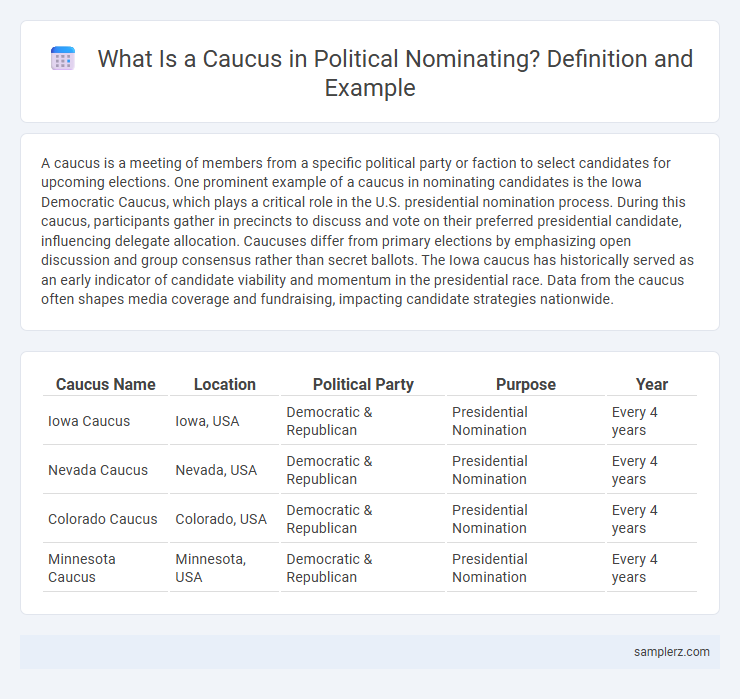A caucus is a meeting of members from a specific political party or faction to select candidates for upcoming elections. One prominent example of a caucus in nominating candidates is the Iowa Democratic Caucus, which plays a critical role in the U.S. presidential nomination process. During this caucus, participants gather in precincts to discuss and vote on their preferred presidential candidate, influencing delegate allocation. Caucuses differ from primary elections by emphasizing open discussion and group consensus rather than secret ballots. The Iowa caucus has historically served as an early indicator of candidate viability and momentum in the presidential race. Data from the caucus often shapes media coverage and fundraising, impacting candidate strategies nationwide.
Table of Comparison
| Caucus Name | Location | Political Party | Purpose | Year |
|---|---|---|---|---|
| Iowa Caucus | Iowa, USA | Democratic & Republican | Presidential Nomination | Every 4 years |
| Nevada Caucus | Nevada, USA | Democratic & Republican | Presidential Nomination | Every 4 years |
| Colorado Caucus | Colorado, USA | Democratic & Republican | Presidential Nomination | Every 4 years |
| Minnesota Caucus | Minnesota, USA | Democratic & Republican | Presidential Nomination | Every 4 years |
Historical Overview of Caucuses in Political Nominations
The Iowa Caucus, established in 1972, has served as a pivotal early indicator in U.S. presidential nominations, shaping candidate momentum and media coverage. Historically, caucuses foster grassroots participation by allowing party members to deliberate and select delegates in a collective setting. This system contrasts with primary elections, emphasizing local engagement and strategic coalition-building within political parties.
Key Functions of Caucuses During Nomination Processes
Caucuses play a crucial role in nominating candidates by facilitating direct voter engagement through local meetings where participants discuss and select preferred nominees. They serve to build consensus within political parties, allowing candidates to gain crucial grassroots support and demonstrate organizational strength. This process enhances party unity and helps streamline candidate selection ahead of primary elections.
Iowa Caucus: A Notable Example in U.S. Presidential Nominations
The Iowa Caucus serves as a critical early event in the U.S. presidential nomination process, often setting the tone for candidates' campaigns. This decentralized meeting of party members involves discussion and voting to select delegates who support particular presidential hopefuls, reflecting grassroots political engagement. Historically, strong performances in the Iowa Caucus can lead to increased media attention and campaign momentum for candidates.
Democratic and Republican Caucus Systems Compared
The Democratic caucus system emphasizes proportional delegate allocation based on candidate support within local meetings, allowing minority preferences to influence outcomes. In contrast, the Republican caucus system often employs a winner-takes-all or winner-takes-most approach, consolidating delegate votes for the leading candidate in each precinct. These structural differences impact candidate strategies and voter engagement during the presidential nomination process.
State-Level Variations in Caucus Practices
State-level variations in caucus practices significantly impact the presidential nominating process, with Iowa's first-in-the-nation caucuses setting a pivotal early tone. States like Nevada and Minnesota use multiple rounds of voting and realignment, emphasizing grassroots participation and local party organization. These variations affect delegate allocation, candidate viability thresholds, and voter engagement, influencing overall campaign strategies.
Caucus vs. Primary: Nomination Impact and Differences
The Iowa Caucus serves as a prominent example of how caucuses influence the presidential nomination process differently from primaries, emphasizing in-person discussion and consensus-building among party members. Unlike primaries, which rely on secret ballots to gauge voter preferences citywide or statewide, caucuses function through local gatherings where participants physically align or debate to support candidates, directly impacting delegate allocation. This distinction affects voter engagement levels, candidate strategy, and momentum, with caucuses often favoring candidates who excel in grassroots organization and face-to-face persuasion.
Famous Political Outcomes Shaped by Caucus Decisions
The Iowa Caucus, known for its early timing in the U.S. presidential primary season, has significantly shaped famous political outcomes by propelling candidates like Barack Obama in 2008 and Pete Buttigieg in 2020 into national prominence. In 1948, the Democratic caucus system in Tennessee helped propel Lyndon B. Johnson's political career, demonstrating the power of caucus decisions in shaping party leadership. These caucus events influence delegate allocation and candidate viability, making them critical in determining party nominees.
Grassroots Participation in Caucus Nominations
Grassroots participation in caucus nominations is exemplified by the Iowa Democratic Caucus, where local voters gather in precinct meetings to discuss and select preferred candidates. This process emphasizes direct citizen involvement and community-level decision-making rather than relying solely on primary elections. Such caucuses empower ordinary party members to influence candidate selection through in-person discussions and real-time vote tallying.
Criticisms and Controversies Surrounding Caucus Methods
The Iowa caucus has faced significant criticisms for its lack of transparency and accessibility, often disadvantaging minority and disabled voters due to its complex, in-person voting procedures. Critics highlight the caucus system's vulnerability to low participation rates and the potential for voter suppression compared to primary elections. Controversies also stem from delayed or inaccurate vote reporting, as evidenced in the 2020 Iowa Democratic caucus, undermining public trust in the nominating process.
Modern Reforms and the Future of Caucus Nominating Systems
Modern reforms in caucus nominating systems emphasize increased transparency and inclusivity, such as virtual caucusing platforms that allow broader voter participation beyond traditional in-person meetings. States like Iowa have experimented with app-based reporting and real-time vote counting to enhance accuracy and trust in the process. Future trends point to hybrid models combining digital tools with grassroots engagement to maintain community-oriented deliberation while expanding accessibility.

example of caucus in nominating Infographic
 samplerz.com
samplerz.com